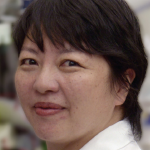Researcher Theresa Lu, MD, PhD, received a Barbara Volcker Center grant as seed money to explore whether fat tissue might influence stromal cells in lymph nodes to contribute to sexual dimorphism in rheumatologic diseases.
“The short answer was ‘no,’ but we learn even from negative results and the grant allowed us to explore further about fat tissue mesenchymal stromal cells and skin fibrosis in scleroderma, a disease that affects women more than men,” Dr. Lu wrote in an email. “We found that fat tissue mesenchymal stromal cell survival is maintained by dendritic cells in fibrotic skin and that prolonging the survival of therapeutically delivered stromal cells can ameliorate skin fibrosis. Thinking about skin pathology additionally helped to move forward a project on lupus photosensitivity.”
Results of her skin fibrosis research were published last year in the Journal of Clinical Investigation and led to another grant from the Scleroderma Foundation.8 That grant will support Dr. Lu’s investigation to further understand the survival mechanisms. “We are hoping to utilize this understanding to improve mesenchymal stromal cell therapy in scleroderma as well as other diseases,” says Dr. Lu.
‘I think I can say that the way in which we approach pregnancy in 2017 has done a 180-degree turn from before we started,’ Dr. Lockshin says. ‘It used to be said that pregnancy would invariably cause lupus to flare up, & therefore, it was contraindicated in all lupus patients. That turns out not to be true.’
Over the years, the Barbara Volcker Center has expanded its reach and in 2012 it received a substantial additional endowment from the Volckers and non-endowment gifts from other donors attracted to its mission, according to Dr. Lockshin.
In 2014, the Center moved to larger office space and recruited new members, including Dr. Sammaritano, known for her work in pregnancy complications and hormone treatment of patients with autoimmune disease, and Dr. Kirou, a physician-scientist in the field of academic rheumatology with a background in mechanisms of lupus nephritis.

Theresa Lu, MD, PhD
A recent member to join the Center is Dr. Barbhaiya, who as a medical resident at Weill Cornell Medicine (New York Presbyterian Hospital) had worked with the Center. She is an authority on environmental aspects of autoimmune illness, such as obesity, alcohol, smoking, race and socioeconomic status, and was recruited in 2017 from the Brigham and Women’s Hospital in Boston.
“My first introduction to the Barbara Volcker Center was when I began working on research projects with Dr. Michael Lockshin and Dr. Doruk Erkan as a medical student at Weill Cornell Medical College nearly a decade ago,” recalled Dr. Barbhaiya in an email. “Although I left New York to complete my rheumatology fellowship at the Brigham and Women’s Hospital, where I subsequently joined the faculty, what drew me back to HSS as a faculty member was the Barbara Volcker Center’s strong emphasis on clinical care and clinical research related to lupus, antiphospholipid syndrome, and pregnancy in rheumatic diseases.”

